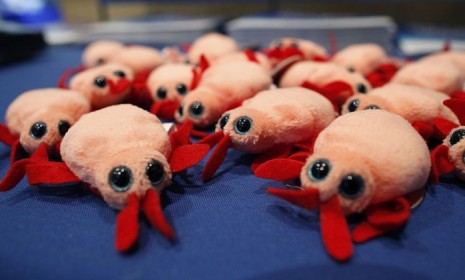Can bedbugs give you a killer infection?
Researchers say bedbugs can carry deadly bacteria. Are the tiny pests capable of spreading more than just irritating inconvenience?

A free daily email with the biggest news stories of the day – and the best features from TheWeek.com
You are now subscribed
Your newsletter sign-up was successful
The bad news keeps coming on the bedbug front. The blood-sucking mattress dwellers are typically thought of as a major nuisance, not a public health threat, but a new study has found that they might help transmit disease. Here, a brief guide:
What did the study find?
Researchers found bedbugs that were carrying staph "superbugs" on three patients at a hospital in a poor area of Vancouver. Five bedbugs were collected and found to be carrying two types of drug-resistant bacteria. While there's no evidence that the bedbugs were spreading the germs, the researchers couldn't rule that out. That makes the preliminary study's findings "intriguing," says one of the scientists.
The Week
Escape your echo chamber. Get the facts behind the news, plus analysis from multiple perspectives.

Sign up for The Week's Free Newsletters
From our morning news briefing to a weekly Good News Newsletter, get the best of The Week delivered directly to your inbox.
From our morning news briefing to a weekly Good News Newsletter, get the best of The Week delivered directly to your inbox.
What bacteria were the bugs carrying?
Three of the bugs were found to have methicillin-resistant Staphylococcus aureus, also known as "flesh-eating bacteria" or MSRA for short. The bacteria has increasingly become a problem in hospitals. It's resistant to many antibiotics, easily spread through casual contact, and capable of causing serious health issues, including disfiguring abscesses and even death if it enters the bloodstream. The other two bugs had vancomycin-resistant Enterococcus faecium, or VRE, a less dangerous bacteria also common in hospitals.
How freaked out by this should we be?
The study was small and therefore not conclusive, so it will take more research to determine whether this is as scary as it sounds. It's still unclear whether the bedbugs infected the humans, or the other way around. "While the work was well done and it shows an association," says Robert Wirtz of the Center for Disease Control and Prevention's Center for Global Health, "it doesn't establish that bedbugs are capable of transmitting the bacteria." Still, the study does give public-health officials something to think about, says Marc Romney, one of the authors. "It suggests that bedbugs may be playing a role in the transmission of MRSA in inner-city populations where bedbug infestations are a problem."
A free daily email with the biggest news stories of the day – and the best features from TheWeek.com
Why did researchers decide to look into this in the first place?
Romney and his colleagues had noticed a "simultaneous boom" in both bedbugs and MSRA infections in the neighborhood.
Where do we go from here?
Wirtz says researchers should now study if bedbugs are capable of transmitting MSRA or VRE to an uninfected system.
Sources: ABC News, Wash. Post, Associated Press
-
 How to Get to Heaven from Belfast: a ‘highly entertaining ride’
How to Get to Heaven from Belfast: a ‘highly entertaining ride’The Week Recommends Mystery-comedy from the creator of Derry Girls should be ‘your new binge-watch’
-
 The 8 best TV shows of the 1960s
The 8 best TV shows of the 1960sThe standout shows of this decade take viewers from outer space to the Wild West
-
 Microdramas are booming
Microdramas are boomingUnder the radar Scroll to watch a whole movie